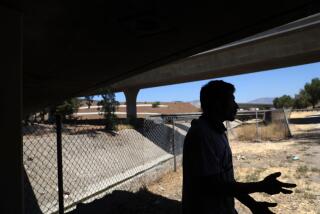Justices Bar N.Y. Ban on Hotel Demolition : Homelessness: The court rules that the city violated developers’ rights in its bid to retain havens for the poor.
WASHINGTON — The Supreme Court refused today to allow New York City, and perhaps other communities, to enlist unwilling developers in the fight against homelessness.
The justices, without comment, left intact a victory for developers who said New York City violated their rights by banning conversion or demolition of hotels that offer a haven for the poor, elderly and ill.
The court let stand a ruling that a law banning conversion or demolition of New York City’s single-room-occupancy, or SRO, housing unconstitutionally confiscates private property.
The New York Court of Appeals ruled, 5 to 2, last July that the law has the effect of seizing property without just compensation.
“No one minimizes the tragic reality of homelessness,” the state court said. “But the city’s response--to foist its responsibility on certain private property owners . . . simply does not meet the requirements of the federal and state constitutions.”
Remedying homelessness is the duty of all taxpayers, not a handful of developers, the state court said. It also said the city failed to produce enough evidence that the law would actually benefit the homeless.
The state court ruling is binding only on cities in New York. But the Supreme Court’s refusal to disturb that decision may discourage communities in other states from emulating New York City.
Notable Supreme Court rulings recently have expanded the rights of property owners faced with government regulations.
The justices in 1987 limited government power to grant public access to private property and ruled that property owners must be compensated when government regulations bar them even temporarily from using their property.
New York Mayor Edward I. Koch called the state court ruling on SRO housing a “devastating blow” to efforts to help the homeless. But some city officials said rent-control regulations barring unjustified evictions may restrain widespread demolition.
Nevertheless, they warned, in time hotel tenants may be bought out or harassed into leaving to clear the way for razing the buildings or converting them.
Many tenants live on the edge of poverty and homelessness, limited to single rooms and sharing kitchen and bathroom facilities.
The SRO preservation law of 1987 required building owners to rehabilitate and rent every unit, not leaving any vacant.
Landlords could have “bought out” of the law by paying $45,000 to the city for each unit destroyed or converted. A typical hotel owner would have had to pay about $10 million to destroy or convert the building.
The state court said such payments amounted to an extortionate “ransom . . . to avoid the illegal confiscation.”
The law was meant to prevent about 52,000 units of SRO housing from being demolished. Tens of thousands of similar units were razed in the 1960s and 1970s as the city encouraged new office buildings and luxury apartments.
The city cited studies showing that the loss of such housing contributes to rising homelessness. Surveys indicate that at least 25%, and perhaps as many as 45%, of the people living in the city’s homeless shelters at one time lived in such hotels.
More to Read
Sign up for Essential California
The most important California stories and recommendations in your inbox every morning.
You may occasionally receive promotional content from the Los Angeles Times.










